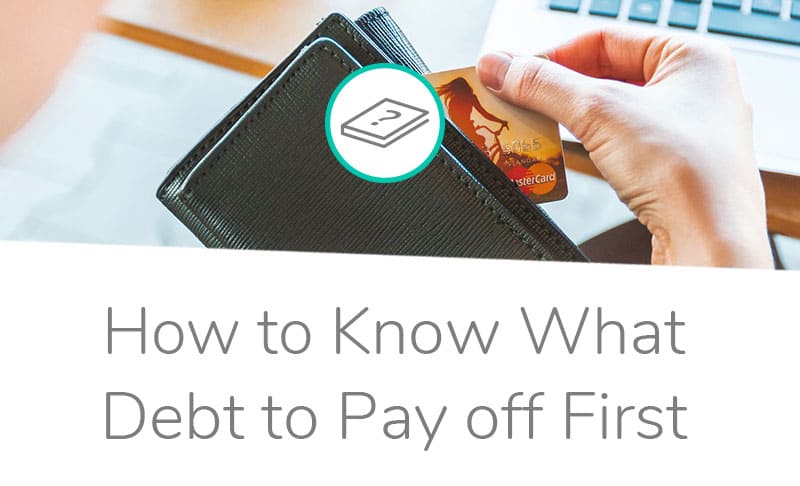
Which Debt Should You Pay Off First?
Want to pay off your debt, but don’t know where to start? You’re not alone. Not all debt is created equal and it can be hard to figure out which accounts to pay off first when you’re trying to get out of the red.
There are different schools of thought when it comes to paying off debt. Some people think accounts with the highest interest should go first, while others believe paying off smaller debts leads to more momentum. It’s important to take a look at the kind of debt you’re carrying and devise a strategy that works best for you.
Good Debt vs. Bad Debt
Your credit statements can help you decide which debts are helping and which debts are hindering your financial situation. Good debt often comes in the form of installment credit — such as student loans, mortgages or car loans — which requires you to make the same monthly payments for the duration of the loan.
This kind of debt is less risky than revolving credit — such as a credit card or line of credit — because the amount of the loan is decided when you sign the contract. Installment credit often has low interest rates and this kind of debt can actually help improve your credit score because it shows that you can responsibly pay back what you’ve borrowed over the long term. Student loans can also give you a tax breaks, so there’s no need to hurry to pay them down.
As a rule, good debt increases your net worth or has future value. Bad debt, on the other hand, loses value quickly and allows you to buy things you don’t have the money for.
Which debt to tackle first
Here are the three types of debt you should pay off in order of importance:
- Debts with the highest interest
- Accounts with the highest credit utilization
- Accounts with the smallest balance.
Debts with the highest interest
Loans or credit cards with high interest rates cost you more to maintain and make it hard to get out in front of your debt. With interest rates between 10% and 30%, credit cards are the worst offenders when it comes to expensive debt and should be paid down first.
Repayment strategy: Speed up payments on high interest loans by opting for bi-weekly payments. And always make the minimum monthly payments on your credit card balance or you’ll end up paying more in interest.
Accounts with the highest credit utilization
Paying off accounts with the biggest balance can lower the amount of credit you’re using and help improve your credit score. Your credit score utilization should be less than 30%, which means if you have a credit limit of $10,000 you should never carry a balance higher than $3,000.
Keep in mind that this only rings true with revolving credit accounts carrying a high balance — installment credit, like a $250,000 mortgage, shouldn’t be your top priority because of the extended time frame you’re given to pay it off.
Repayment strategy: Pick out which debts are quickly approaching their borrowing limit and work on paying those down first.
Accounts with the smallest balance
How good would it feel if you had just one less debt to worry about? Paying off your smallest loan might seem like a non-accomplishment, but you’d be surprised. Depending how small your loan is, getting that balance down to $0 is something you can do relatively quickly and it can give you a motivation boost. Knowing you’ve got one less thing on your plate can make it easier to pick away at your larger debts.
Repayment strategy: Pick your lowest debt and throw a little extra money at it each month and whenever you have extra cash.
Consider consolidation
You can also deal with debt by simply moving your money around. Many banks and lenders offer consolidation loans, which allow you to pull all of your outstanding debts into one account under one interest rate. This can make it easier to manage debt repayment because you only have to make one payment each month.
A good strategy is key
Paying off debt in the right order can be beneficial in the long run, but whether you’re $5,000 or $50,000 in debt the most important part of successfully paying off any kind of loan is coming up with a repayment strategy that works for you and sticking to it. Setting goals, tracking your progress and keeping yourself accountable are all good ways to keep moving forward.
The most important thing to remember when it comes to managing debt, is not to overextend yourself. When you’re ready to purchase your next vehicle, the loan specialists at Birchwood Credit Solutions can help you make sure you’re not exceeding an advisable level of credit score utilization. Take a few minutes to fill out our online application form today.
If you’re looking for some extra support, you may want to consider credit counselling. What is credit counselling? We’ll walk you through what it is, how it works and how it affects your credit. We’re here to help you rebuild your credit and take control of your finances.
Related Posts:
How to Payoff a Car Loan Faster
How to Deal With a Collections Agency
Top Budgeting Apps for Canadians



